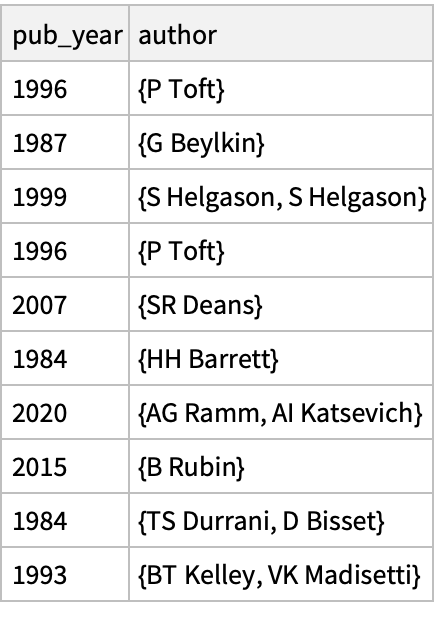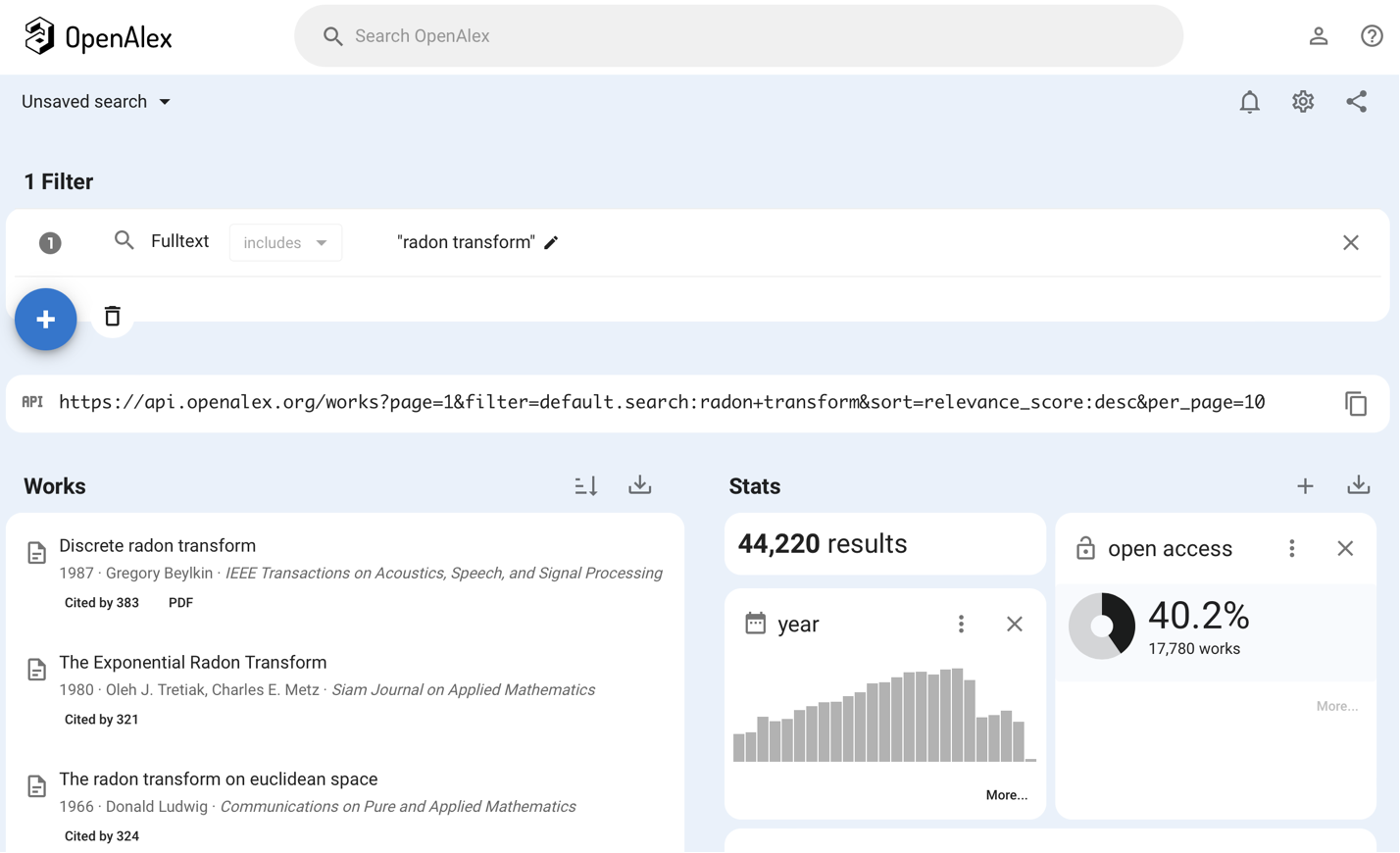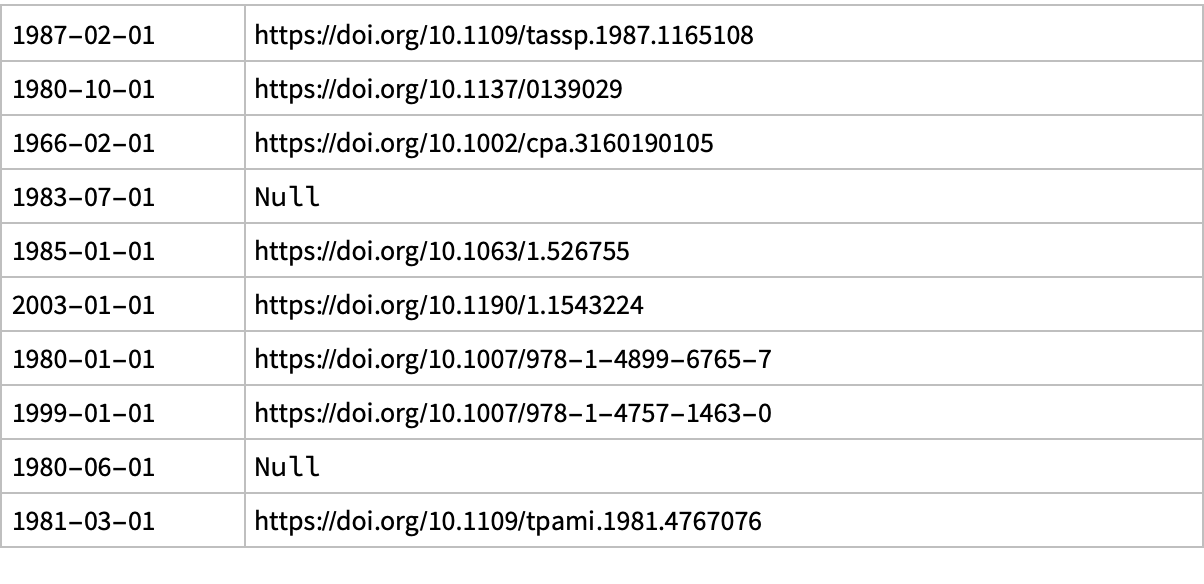Automated Bibliometrics with GoogleScholar and OpenAlex
[mathematica science data GregH asks: “How can I save all citations from a Google Scholar search? For instance, in a search for “Radon transformation”, there are about 35,500 results. I want to download all citations into a string - is there a simple way to get Mathematica to do that? (And sorry, no, I haven’t tried anything yet. Not sure where to start.)”. A demonstration of automating Google Scholar…and a better way using OpenAlex…
Google Scholar (using scholarly)
GoogleScholar is not really intended for programmatic access, and you may also hit usage limits. That being said, python packages like scholarly exist to do this, and if you make only a few requests, you should be fine:
ResourceFunction["PythonPackageInstall"]["scholarly"]

session = StartExternalSession[
<|"System" -> "Python",
"SessionProlog" -> "from scholarly import scholarly"|>]
searchPubs = ExternalFunction[session,
"def search(terms):
query = scholarly.search_pubs(terms)
results = []
for i in range(10):
results.append(next(query))
return results"]


example = searchPubs["Radon transform"];
Dataset@Query[All, "bib", {"pub_year", "author"}]@example

A better way: The OpenAlex API
Unlike Google Scholar, OpenAlex is an open project that makes it easy to get data. The easiest way is get started is to do a text search through the web, and then click the gear button to generate the corresponding API query:

It is then straightforward to copy and execute the corresponding API query in Mathematica (you may of course modify the result) to suit your needs:
example2 = URLExecute["https://api.openalex.org/works?page=1&filter=default.search:radon+transform&sort=relevance_score:desc&per_page=10"];
Dataset@Query["results", All, {"publication_date", "doi"}]@example2

OpenAlex has many other powerful features, including (machine-learned) topic groupings, links to open access versions of documents, etc. The documentation is excellent.
Advanced Application: Generating Coauthorship Lists
Bullshit forms are the bane of every working scientist’s life. COA/COI co-authorship forms are one such example–this becomes tricky if (like me), you write papers with many different people, including large consortia.
We need to do a bit of work to extract the author information, so we define a few functions for this:
(*display name is a string; reformat to a list of {Last, First M.} *)
reformatName[name_String] := First@StringCases[first__ ~~ Shortest[Whitespace ~~ last__ ~~ EndOfString] :> {last, first}]@name
(* extract information for one coauthor *)
extractCoauthorItem[authorItem_] := With[
{author = reformatName@ Query["author", "display_name"]@authorItem,
orcid = Query["author", "orcid"]@authorItem,
place = Query["institutions", 1, "display_name"]@authorItem},
{author[[1]], author[[2]], orcid /. Null -> "", place /. Missing[_, _] -> "", "Coauthor"}
]
(* for a given paper, extract information about all coauthors *)
extractCoauthorsForPaper[paperItem_] := With[
{year = Query["publication_year"]@paperItem,
coauthors = Map[extractCoauthorItem]@Query["authorships"]@paperItem},
Append[year] /@ coauthors]
We can then proceed by retrieving all of the papers for the past four years, extracting the list of coauthor information, and then removing entries which have duplicate {last, first} names. This will not be perfect, as sometimes the authors have different initials, but it gets you most of the way through the process. (Comment: A better solution would use the authorID as a unique key and then lookup information from there, but I needed a quick-and-dirty solution to meet a deadline.) Finally, we export it as an excel spreadsheet, to do some manual cleanup before pasting it into the requisite forms.
papers = URLExecute["https://api.openalex.org/works?filter=authorships.author.id:a5073376584,publication_year:2020-2024&per-page=100"];
coauthors = Join @@ Map[extractCoauthorsForPaper]@Query["results"]@papers;
result = SortBy[First]@DeleteDuplicatesBy[#[[1 ;; 2]] &]@ReverseSortBy[Last]@coauthors;
Export["~/Downloads/2024.03.12_coauthors_schrier.xlsx", result]
ToJekyll["Automated Bibliometrics with GoogleScholar and OpenAlex", "mathematica science data"]